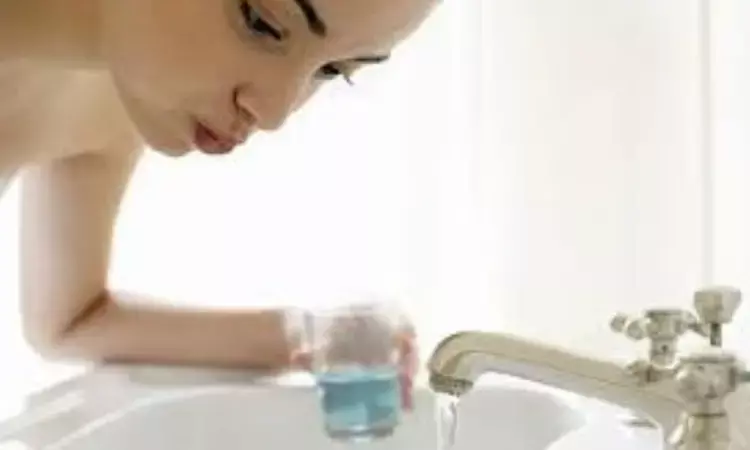- Home
- Medical news & Guidelines
- Anesthesiology
- Cardiology and CTVS
- Critical Care
- Dentistry
- Dermatology
- Diabetes and Endocrinology
- ENT
- Gastroenterology
- Medicine
- Nephrology
- Neurology
- Obstretics-Gynaecology
- Oncology
- Ophthalmology
- Orthopaedics
- Pediatrics-Neonatology
- Psychiatry
- Pulmonology
- Radiology
- Surgery
- Urology
- Laboratory Medicine
- Diet
- Nursing
- Paramedical
- Physiotherapy
- Health news
- Fact Check
- Bone Health Fact Check
- Brain Health Fact Check
- Cancer Related Fact Check
- Child Care Fact Check
- Dental and oral health fact check
- Diabetes and metabolic health fact check
- Diet and Nutrition Fact Check
- Eye and ENT Care Fact Check
- Fitness fact check
- Gut health fact check
- Heart health fact check
- Kidney health fact check
- Medical education fact check
- Men's health fact check
- Respiratory fact check
- Skin and hair care fact check
- Vaccine and Immunization fact check
- Women's health fact check
- AYUSH
- State News
- Andaman and Nicobar Islands
- Andhra Pradesh
- Arunachal Pradesh
- Assam
- Bihar
- Chandigarh
- Chattisgarh
- Dadra and Nagar Haveli
- Daman and Diu
- Delhi
- Goa
- Gujarat
- Haryana
- Himachal Pradesh
- Jammu & Kashmir
- Jharkhand
- Karnataka
- Kerala
- Ladakh
- Lakshadweep
- Madhya Pradesh
- Maharashtra
- Manipur
- Meghalaya
- Mizoram
- Nagaland
- Odisha
- Puducherry
- Punjab
- Rajasthan
- Sikkim
- Tamil Nadu
- Telangana
- Tripura
- Uttar Pradesh
- Uttrakhand
- West Bengal
- Medical Education
- Industry
Mouthwashes may reduce risk of coronavirus transmission, finds study

Researchers from Ruhr-Universität Bochum together with colleagues from Jena, Ulm, Duisburg-Essen, Nuremberg, and Bremen have found that COVID 19 can be inactivated using certain commercially available mouthwashes.
High viral loads can be detected in the oral cavity and throat of some Covid-19 patients. The use of mouthwashes that are effective against Sars-Cov-2 could thus help to reduce the viral load and possibly the risk of coronavirus transmission over the short term. This could be useful, for example, prior to dental treatments. However, mouth rinses are not suitable for treating Covid-19 infections or protecting yourself against catching the virus.
The results of the study are described by the team headed by Toni Meister, Professor Stephanie Pfänder and Professor Eike Steinmann from the Bochum-based Molecular and Medical Virology research group in the Journal of Infectious Diseases, published online on 29 July 2020. A review of laboratory results in clinical trials is pending.
Eight mouthwashes in a cell culture test
The researchers tested eight types of mouthwash with different ingredients that are available in pharmacies or drugstores in Germany. They mixed each mouthwash with virus particles and an interfering substance, which was intended to recreate the effect of saliva in the mouth. The mixture was then shaken for 30 seconds to simulate the effect of gargling. They then used Vero E6 cells, which are particularly receptive to Sars-Cov-2, to determine the virus titer. In order to assess the efficacy of the mouthwashes, the researchers also treated the virus suspensions with cell culture medium instead of the mouthwash before adding them to the cell culture.
All of the tested preparations reduced the initial virus titer. Three mouthwashes reduced it to such an extent that no virus could be detected after an exposure time of 30 seconds. Whether this effect is confirmed in clinical practice and how long it lasts must be investigated in further studies.
The authors point out that mouthwashes are not suitable for treating Covid-19. "Gargling with a mouthwash cannot inhibit the production of viruses in the cells," explains Toni Meister, "but could reduce the viral load in the short term where the greatest potential for infection comes from, namely in the oral cavity and throat -- and this could be useful in certain situations, such as at the dentist or during the medical care of Covid-19 patients."
Clinical studies in progress
The Bochum group is examining the possibilities of a clinical study on the efficacy of mouthwashes on Sars-Cov-2 viruses, during which the scientists want to test whether the effect can also be detected in patients and how long it lasts. Similar studies are already underway in San Francisco; the Bochum team is in contact with the American researchers.
Dr Kamal Kant Kohli-MBBS, DTCD- a chest specialist with more than 30 years of practice and a flair for writing clinical articles, Dr Kamal Kant Kohli joined Medical Dialogues as a Chief Editor of Medical News. Besides writing articles, as an editor, he proofreads and verifies all the medical content published on Medical Dialogues including those coming from journals, studies,medical conferences,guidelines etc. Email: drkohli@medicaldialogues.in. Contact no. 011-43720751


